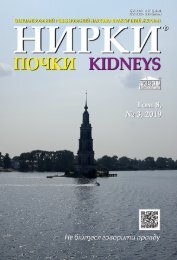Журнал "Почки" том 10, №3
Create successful ePaper yourself
Turn your PDF publications into a flip-book with our unique Google optimized e-Paper software.
Îðèã³íàëüí³ ñòàòò³
Original Articles
UDC 616.12-008.46
DOI: https://doi.org/10.22141/2307-1257.10.3.2021.239591
D.D. Ivanov 1 , M.D. Ivanova 1 , T. Crestanello 2
1
Shupyk National Healthcare University of Ukraine, Kyiv, Ukraine
2
Milan, Italy
Final results of BIRCOV trial
(ARB, ACEI, DRi in COVID-19)
Abstract. Background. The question of the possible effect of the inhibitors of the renin-angiotensin system
(iRAS) on hypertensive subjects who fell ill with COVID-19 has been discussed in the literature. SARS-CoV-2
is well-known to use an angiotensin-converting enzyme 2 receptors facilitating virus entry into host cells.
There are three possible mechanisms of angiotensin-converting enzyme inhibitors (ACEi) and angiotensin
receptor blockers (ARB) effect in COVID-19 in clinical practice: with worsening, neutral, or helpful function.
Considering the different mechanisms of blood pressure reduction by iRAS, one can expect differences in
people with COVID-19 receiving these drugs. The purpose of the BIRCOV study is to pinpoint possible clinical
and laboratory differences in hypertensive people who received iRAS and suffered from coronavirus
infection. Materials and methods. Patient-Oriented Evidence that Matters (POEM) intervention was designed
as an open prospective randomized two medical centers trial in subjects suffering from COVID-19
who have been receiving iRAS, either ACEi, ARB, or direct renin inhibitor (DRi) as basic antihypertensive
therapy. One hundred and twenty people with stage 1–2 hypertension have been screened, 108 subjects
were enrolled in the BIRCOV study. COVID-19 was confirmed by a PCR test; the disease follow-up was
divided into 2 periods: up to 12 weeks and up to 24 weeks. The primary outcome measure was as follows:
blood pressure (BP) was known one week before COVID-19 onset and was measured during the disease
on weeks 2, 4, 12, 24. The secondary outcome measures were clinical features. Subanalysis in patients with
chronic kidney disease (CKD) was performed. Results. All patients were randomized into 3 groups who
received: ACEi — 42 (39 %), ARB — 35 (32 %), or DRi — 31 (29 %). The BIRCOV trial documented the trend of
BP lowering in the first two weeks of the COVID-19 disease with its gradual return to baseline values up to
the 12 th week. Twenty-three (21 %) patients have withdrawn medicine for up to 2 weeks due to severe hypotension.
However, the BP values after COVID-19 in most subjects remained lower than the baseline ones
for 4 weeks. The use of ACE inhibitors significantly increased the risk of withdrawal compared to DRi (RR
1.648; 95% CI 0.772–3.519; NNT 7.0) and ARB (RR 13.023; 95% CI 1.815–93.426; NNT 2.9) due to COVID-19. The
synchronous decline of estimated glomerular filtration rate (eGFR) and systolic BP was more pronounced
in CKD patients. The greatest decrease in eGFR was noted in people who have been taking ACEi. The drop
in eGFR ranged from 23 % in CKD stage 1 to 45 % in CKD stage 4. Two people required short-term dialysis.
The analysis of secondary outcome points demonstrated that in 23 % of people without preceding albuminuria
it developed in the A2 range. During 12 weeks of observation, 81 % of patients had spontaneous
albuminuria reduction. Post-COVID-19 (above 12 weeks) albuminuria remained in 19 % of patients, 90 % of
them had a history of CKD. Patients with preceding CKD had an increase in albuminuria in 78 % of cases,
and its return to the baseline was observed only in 24 % of patients by the 12 th week and in 49 % of individuals
in 24 weeks. Conclusions. People with stage 1–2 hypertension who are receiving chronic iRAS and suffer
from COVID-19 may develop hypotension with ACE inhibitors. COVID-19 leads to transient albuminuria and
decreased glomerular filtration rate, which is especially dangerous for people with CKD.
Keywords: renin-angiotensin system inhibitors; angiotensin receptor blockers; angiotensin-converting
enzyme inhibitors; direct renin inhibitor; COVID-19; BIRCOV trial
© «Нирки» / «Kidneys» ( ), 2021
© Видавець Заславський О.Ю. / Publisher Zaslavsky O.Yu., 2021
Для кореспонденції: Іванов Дмитро Дмитрович, доктор медичних наук, професор, завідувач кафедри нефрології і нирково-замісної терапії, Національний університет охорони здоров’я
України імені П.Л. Шупика, вул. Дорогожицька, 9, м. Київ, 04112, Україна; e-mail: mmaprofivanov@gmail.com
For correspondence: Dmytro D. Ivanov, MD, PhD, Professor, Head of the Department of Nephrology and Renal Replacement Therapy, Shupyk National Healthcare University of Ukraine, Dorohozhytska st.,
9, Kyiv, 04112, Ukraine; e-mail: mmaprofivanov@gmail.com
Full list of authors information is available at the end of the article.
Òîì 10, ¹ 3, 2021
www.mif-ua.com, http://kidneys.zaslavsky.com.ua 37














